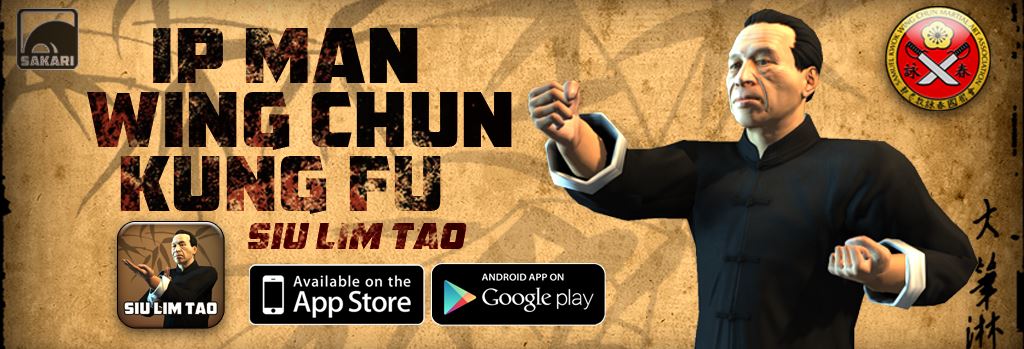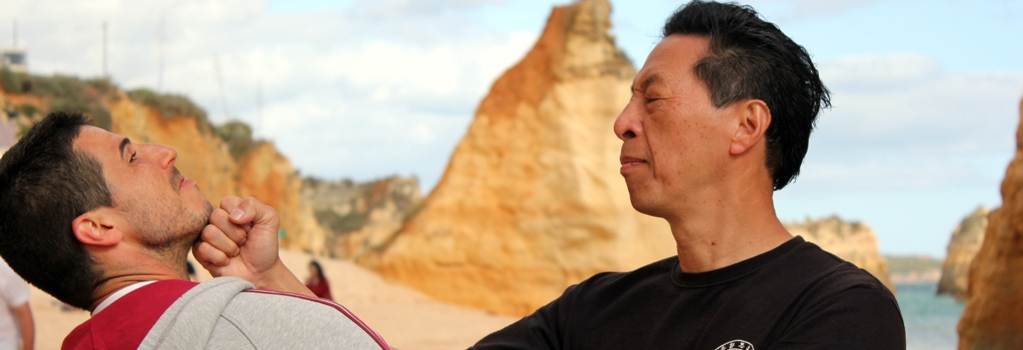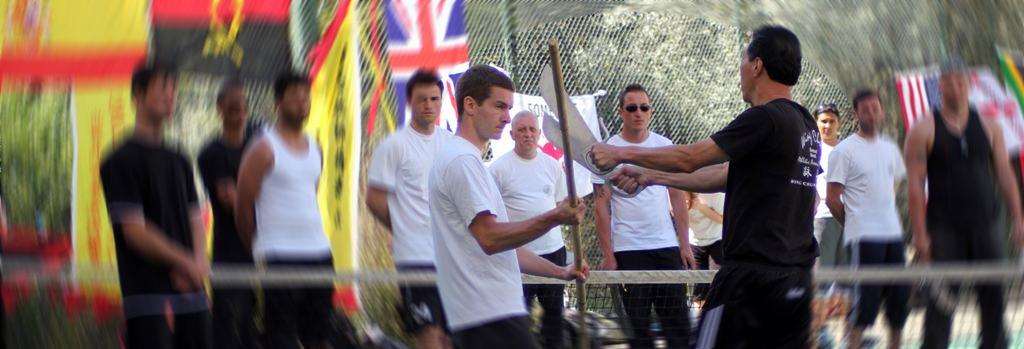Strength Training and Wing Chun
Article by David Jarrett added on 30 Aug 2012. Last updated on 30 Aug 2012.
Strength & weight training for Martial arts
By David Jarrett, Putney Wing Chun instructor
Physical strength is a controversial topic in Wing Chun and martial arts in general. Many Wing Chun practitioners advise against doing too much strength training as this could hinder your Wing Chun progress. A number of reasons are given. However, in my opinion these reasons have extremely limited merit.
Myth 1: Strength training slows you down
 Strength training, or too much strength training, is said by many to slow you down. I am not sure where this idea comes from, but it is extremely widespread. However, the idea is completely wrong. The world's fastest athletes, Olympic sprinters, use extensive weight training regimes to build the strength in their legs and bodies which allows them to power down the track. Meanwhile Mariusz Pudzianowski, five times World's Strongest Man, can run 100 meters in under 12 seconds which is rapid.
Strength training, or too much strength training, is said by many to slow you down. I am not sure where this idea comes from, but it is extremely widespread. However, the idea is completely wrong. The world's fastest athletes, Olympic sprinters, use extensive weight training regimes to build the strength in their legs and bodies which allows them to power down the track. Meanwhile Mariusz Pudzianowski, five times World's Strongest Man, can run 100 meters in under 12 seconds which is rapid.
 Additionally, when we think of some of the world's fastest punchers and martial artists, we also see that they did extensive strength training. In terms of famously fast punchers take for example, Mohammed Ali, considered the fastest heavyweight of all time. He did hundreds of press-ups every day and was incredibly strong in the ring, never being out-muscled. Similarly, Mike Tyson did hundreds of press-ups every day and in his prime combined immense brute strength with explosive punching power.
Additionally, when we think of some of the world's fastest punchers and martial artists, we also see that they did extensive strength training. In terms of famously fast punchers take for example, Mohammed Ali, considered the fastest heavyweight of all time. He did hundreds of press-ups every day and was incredibly strong in the ring, never being out-muscled. Similarly, Mike Tyson did hundreds of press-ups every day and in his prime combined immense brute strength with explosive punching power.
 Meanwhile super-fast martial arts film star Bruce Lee was on a traditional bodybuilder's weights regime when at his peak. Within the Samuel Kwok Martial Arts Association, we have our very own Paul Smith, former Mr Scotland in bodybuilding and also possibly the fastest moving martial artist I have seen in the flesh. It is thus clear that being too strong does not slow you down. In fact, the opposite is the case. Strength training helps build explosive speed.
Meanwhile super-fast martial arts film star Bruce Lee was on a traditional bodybuilder's weights regime when at his peak. Within the Samuel Kwok Martial Arts Association, we have our very own Paul Smith, former Mr Scotland in bodybuilding and also possibly the fastest moving martial artist I have seen in the flesh. It is thus clear that being too strong does not slow you down. In fact, the opposite is the case. Strength training helps build explosive speed.
There are of course many strong people that are physically slow, usually caused by eating a lot and gaining a lot of body fat. However, there are also many weak people who have a large amount of body fat and are slow. If you gain lots of body fat, it will slow you down whether you are strong or not. It is worth noting however, that a strong "overweight" person such as a rugby player (where extra bulk is an advantage) will usually move far faster than a weak overweight person. Anyone who has ever watched a live rugby match will testify to the shocking speed of these big men.
 One problem with bulking up with strength training is that stamina suffers. As evidence of this, look at how the faster, more powerful decathletes and heptathletes lag behind the slimmer, weaker athletes when it comes to the endurance events. How this creates a problem in Wing Chun training is that on average, larger, stronger people will not be able to train at a high intensity for as long as people with smaller frames. For example, they will burn out quicker, on average, when asked to practice kicking or punching for long periods of time. They may have to take regular rests, or may have to practice at a low intensity. This means that they may take slightly longer than smaller people to perfect techniques. That larger, more muscular people get tired quicker perhaps explains their reputation for being "slow", when in fact they are just fatigued. Another way this problem may manifest itself is that bigger, stronger Wing Chun students will struggle in a fight if it is a long, drawn out affair as they will get tired quicker, on average. However, when they are fresh the stronger, more muscular person will on average be physically faster.
One problem with bulking up with strength training is that stamina suffers. As evidence of this, look at how the faster, more powerful decathletes and heptathletes lag behind the slimmer, weaker athletes when it comes to the endurance events. How this creates a problem in Wing Chun training is that on average, larger, stronger people will not be able to train at a high intensity for as long as people with smaller frames. For example, they will burn out quicker, on average, when asked to practice kicking or punching for long periods of time. They may have to take regular rests, or may have to practice at a low intensity. This means that they may take slightly longer than smaller people to perfect techniques. That larger, more muscular people get tired quicker perhaps explains their reputation for being "slow", when in fact they are just fatigued. Another way this problem may manifest itself is that bigger, stronger Wing Chun students will struggle in a fight if it is a long, drawn out affair as they will get tired quicker, on average. However, when they are fresh the stronger, more muscular person will on average be physically faster.
Myth 2: Strength training makes you inflexible
Strength training does not make you inflexible. Our friend Mariusz Pudzianowski, mentioned above, is said to be able to perform the splits, as can a number of the world's top bodybuilders as seen in the images below. We can also see that male Olympic gymnasts have both very muscular, strong physiques as well as excellent flexibility.

Eight times Mr Olympia winner, Ronnie Coleman.
There are of course strong people that are inflexible. However, this is due to not stretching regularly. Weak people who do not stretch also lack flexibility. Muscles can feel especially tight after weight training but this is a temporary condition which ends once the muscles have had adequate rest, and can usually be avoided with adequate stretching.
Advantages of strength in Wing Chun
There are multiple advantages to being stronger in Wing Chun. The first is that it will help increase punching power and overall speed. However, this is just the beginning. By strength training you will find it easier to control your opponent's arms far easier. For example, when someone performs a Lap Sau and straight punch against me, I can usually keep my elbow high so that I can block their punch with my forearm (Bong Sau). This allows me to keep one arm free to punch. However, when someone performs a Lap Sau which combines good technique and strength, I am unable to use this technique, and have to block with my free arm instead of throwing a quick counter punch. Weak people simply lack this advantage over me. Similarly, when a Pak Sau is performed on my arm with good technique and power, it can move my guard arm enough to make me vulnerable to a punch. Weaker people are simply unable to move my guard with this technique. The list goes on.
Points to consider
 Of course strength is always relative. Thus unless you are Mariusz Pudzianowski, there is always somebody stronger than you. For this reason, when training in class, even if you are the strongest there, you should not train only those techniques which can be performed on your weaker classmates. You should also practice as if you are the same strength as, or weaker than them, preparing you for outsiders. This can actually be extremely difficult and can feel very strange, thus putting the stronger person at a slight disadvantage. However, if you are the strongest at you class, this type of training is necessary to prepare you for stronger opponents. Another tip is to try to train with people that are as close to your strength as possible.
Of course strength is always relative. Thus unless you are Mariusz Pudzianowski, there is always somebody stronger than you. For this reason, when training in class, even if you are the strongest there, you should not train only those techniques which can be performed on your weaker classmates. You should also practice as if you are the same strength as, or weaker than them, preparing you for outsiders. This can actually be extremely difficult and can feel very strange, thus putting the stronger person at a slight disadvantage. However, if you are the strongest at you class, this type of training is necessary to prepare you for stronger opponents. Another tip is to try to train with people that are as close to your strength as possible.
Another important point to consider is that whilst strength helps, it is by no means the most decisive factor in good Wing Chun, or martial arts in general. This has been shown when Mariusz Pudzianowski decided to take up professional ring fighting, after training in martial arts for years. He has won three fights but also lost to former UFC champion Tim Sylvia, proving that strength is by no means everything in martial arts. Other equally important factors are good technique, quick thinking and experience.
Tim Sylvia dominating against strongman Mariusz Pudzianowski
Article by David Jarrett
London instructor for the SKMAA at the Putney Wing Chun club
Tags for this article:
Weight TrainingStrengthWeight LiftingMma



